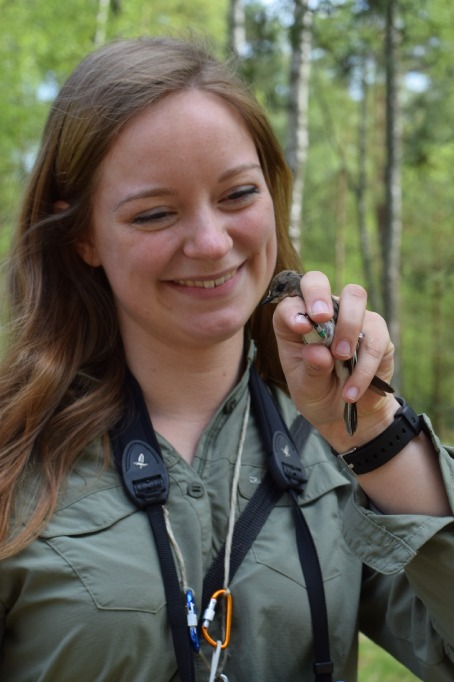Migratory birds adapt by moving north
Spring is starting increasingly early due to climate change. Migratory birds that spend the winter in Africa are struggling to adapt to this: because of the early spring, they arrive too late to make use of the brief period in which there is plenty of food for their young. A potential solution is to continue flying north, where spring starts later and where they will be able to raise their young at the right time. Biologists from the University of Groningen investigated whether this could be an advantageous strategy. In an article that was published in the journal Nature Ecology & Evolution on 14 September, they show that this could indeed be a way for European pied flycatchers to adapt to climate change.
Text: Christiaan Both | edited by FSE Science newsroom
To find out whether flycatchers genuinely raise more young if they move north, the researchers moved female flycatchers from Drenthe (in the Netherlands) to southern Sweden. The birds were captured on the day they arrived from Africa and driven to Sweden that night. This is where they were released into a large aviary in the forest. It simulated another day of flying.

A Swedish male flycatcher was also placed in the aviary and the pair was released a few days later to enable the flycatchers to breed under natural conditions. The move was a huge success for the Dutch females: they bred earlier than their Swedish counterparts and raised more than twice as many young. This suggests that moving north is a beneficial adaptation to climate change for these birds.
Faster evolution
But does moving north ensure long-term adaptation to the increasingly early spring? It is known that European pied flycatchers from the Netherlands migrate and breed approximately two weeks earlier than Swedish birds because spring starts earlier here than in the far north. If this has a hereditary origin and the young from immigrants from the Netherlands are, therefore, also leaving Africa earlier, it could lead to a faster evolution rate. To investigate this, the researchers took eggs from Dutch flycatchers to Sweden, where they were incubated by Swedish parents. This meant that there were three groups of flycatchers being raised in Sweden: fully Dutch (with Swedish parents), fully Swedish, and the half-Dutch and half-Swedish young from Dutch mothers who paired with Swedish males.




The researchers anxiously awaited the return of these young the following year, to see if there was a difference in the annual cycle of the three groups. Fortunately, many young returned to the place where they were raised and there appeared to be a marked difference. Dutch birds that were raised in Sweden arrived there in spring almost two weeks earlier than the fully Swedish birds and, subsequently, also bred 10 days earlier. The timings of the half-Dutch and half-Swedish young was exactly in between. This is evidence that differences between the Dutch and Swedish flycatchers have a genetic origin. Therefore, when Dutch flycatchers continue flying on to Sweden, not only are they more successful themselves, but they also give evolutionary adaptation to climate change a push in the right direction.
A final question was whether migratory birds also spontaneously move to more northerly regions as an adaptation to climate change. The researchers saw that flycatchers did indeed do this quite frequently. By ringing a large number of young flycatchers and, subsequently, tracking them, they were able to show that the young from Drenthe are currently frequently continuing to fly on to northern Germany to breed. This means that it is important for research on adaptation to climate change to study multiple populations of a species, which does not yet happen often.
Solution for climate change?
Climate change presents huge challenges for many animal species. Their habitats are disappearing or they are unable to adapt adequately to the new climatic conditions. The new study shows that there is a potential solution for European pied flycatchers, but it does not mean that this applies to all animal species. Many animal species are unable to move fast from one place to another, which means that moving to more northerly regions is very slow. Other species are unable to move further north because there is no suitable habitat for them. And even among migratory birds, which are able to move with ease, there are many species that already show a strong decline in numbers. These species are, apparently, unable to respond to climate change. It is, therefore, unclear which species are able to adapt by moving north.
Reference: Koosje P. Lamers, Jan-Åke Nilsson, Marion Nicolaus & Christiaan Both: Adaptation to climate change through dispersal and inherited timing in an avian migrant. Nature Ecology & Evolution, 14 September 2023
| Last modified: | 10 February 2025 09.16 a.m. |
More news
-
06 May 2025
Overcoming grid congestion: ‘Making better use of what we already have’
Grid congestion poses a major problem. There is little to no capacity to connect new households and businesses to the power grid and it risks halting the energy transition. Michele Cucuzzella, Associate Professor of Energy Systems & Nonlinear...
-
29 April 2025
Impact | Rubber recycling
In the coming weeks the nominees for the Ben Feringa Impact Award 2025 will introduce themselves and their impactful research or project. This week: Francesco Picchioni on his innovative way to recycle rubber.
-
29 April 2025
Impact | Improving Human-AI Decision-Making in healthcare
In the coming weeks the nominees for the Ben Feringa Impact Award 2025 will introduce themselves and their impactful research or project. This week: Andra Cristiana Minculescu on her research project on Human-AI Decision-Making in healthcare.

